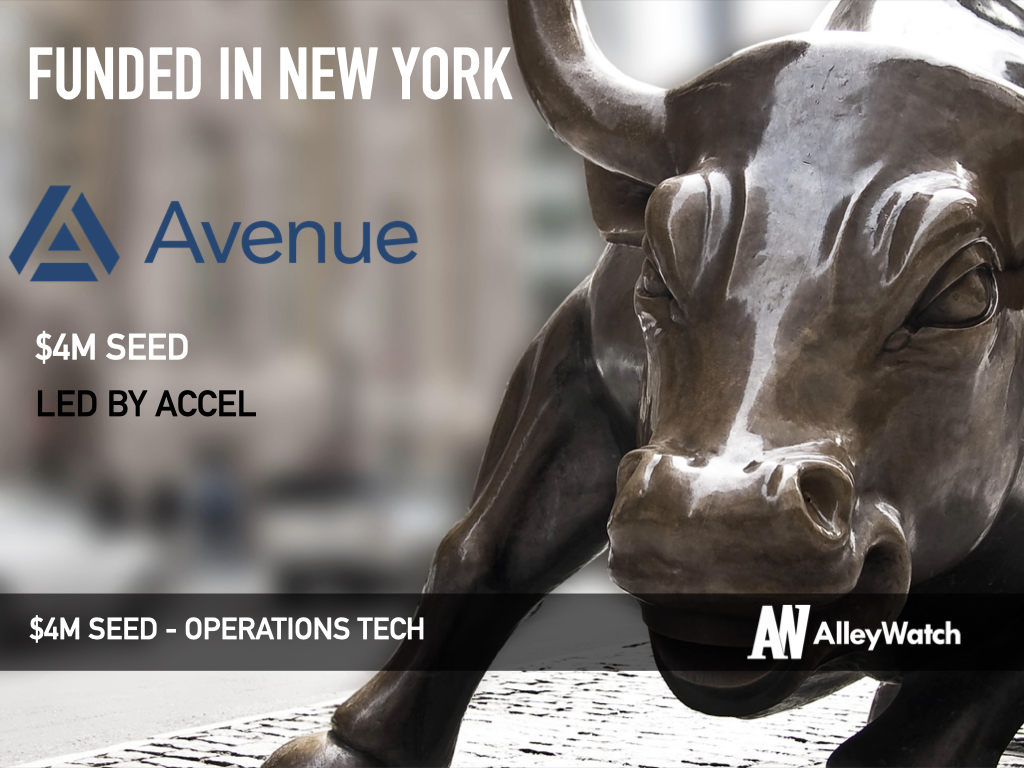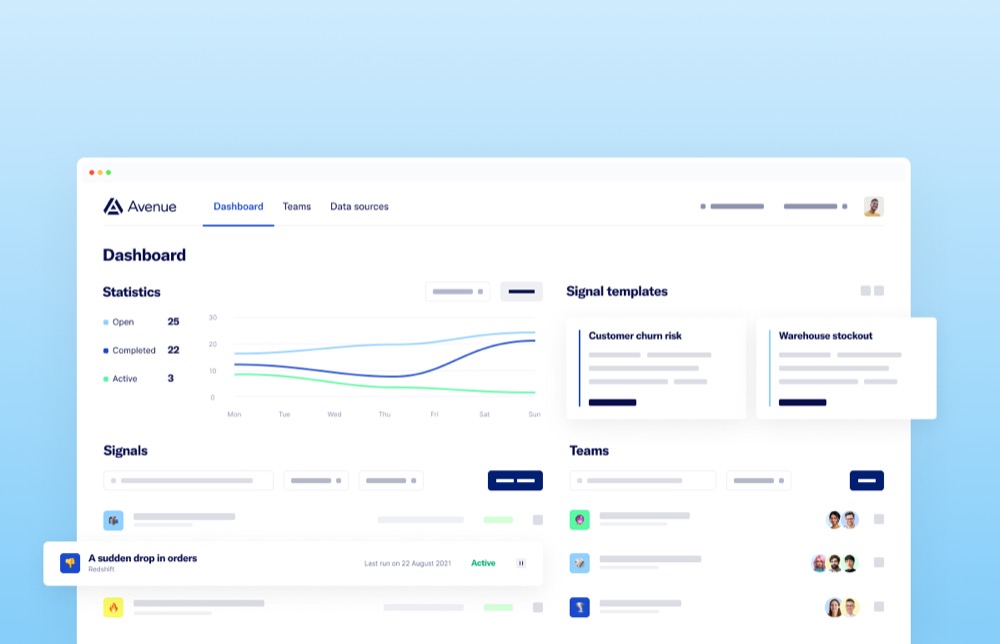There are countless tools that are designed for engineers to monitor infrastructure whether it be for the cloud, applications, or IT. But what happens when it comes to operations, which effectively governs goods, services, and people and how they interact within a company’s customer journey from first contact to service delivery. Avenue is an observability platform that allows operations teams to build alerts from their database or data warehouses to identify critical business issues in real-time. Non-technical teams can easily set up these alerts on a myriad of data, without extensive knowledge of code, and the alerts flow directly into existing workflows like Slack or other channels. This brings versatility and usability to the platform as use cases can range from monitoring inventory levels to identifying churn risk. Any incidents can be tracked to ensure they are being handled from acknowledgment to resolution.
AlleyWatch caught up with Avenue CEO and Cofounder Justin Bleuel to learn more about the founding team’s experience at ops-driven companies led to the AHA moment that sparked the company, the company’s experience at Y Combinator, strategic plans, recent round of funding, and much, much more.
Who were your investors and how much did you raise?
We raised $4 million in Seed funding led by Accel, after coming out of the Y Combinator W21 Batch. We wanted an opinionated partner who could help us with aspects of go-to-market and deeply understood the changing data landscape. Our lead investor Amit Kumar, Partner at Accel, recently led Airbyte’s seed round, an open-source ETL tool, and Avenue is a natural extension to the modern data stack.
Our round also included leaders across ops-driven companies like Flexport, Airbnb, Uber Eats, Thumbtack, Coinbase, Binance alongside angels Lachy Groom and Elad Gil.
Tell us about the product or service that Avenue offers.
Avenue is an alerting and incident response product for operations teams. Ops teams can connect their database or data warehouse and define alerts through SQL or a visual query editor. Alerts send notifications to Slack (or other channels), and operations teams can track incidents in Avenue from acknowledgement, triage, escalation, through to resolution.
Companies today rely on Avenue to passively monitor a variety of different business events, from warehouse stockouts and late deliveries to unresponsive kiosks, churn-risk accounts, and much more etc. Avenue lets operations teams easily create these alerts and escalation policies to drive issues to resolution.
What inspired the start of Avenue?
Avenue stems from my experience as a Product Manager at Uber. At Uber, our ability to launch and scale quickly relied on our Operations team around the world. Their role was to monitor a complex system, but the tools most ops teams have are either reactive, make-shift, or require constant engineering.
Meanwhile, engineers have standard incident response workflows to monitor systems, at-scale. In the last 10-15 years, there’s been a Cambrian explosion of tools in the market (like Sentry, PagerDuty, and DataDog) that enable this workflow for observability and incident response for engineering teams.
Avenue builds this tooling for non-technical operations teams. Our product enables ops teams to create an incident response workflow directly from a SQL query or visual editor.
Unlike engineering-focused tools, we let companies connect their database or data warehouse to monitor business events. Avenue sends context-based alerts to Slack. Ops teams triage and resolve those issues directly in Slack.
Most operations teams today live in dashboards. Companies rely on a system of dashboard sweeps and refer to internal documentation on when and whom should be notified when something seems off.
Dashboards are great at understanding a point-in-time snapshot of your business health, but Avenue lets companies monitor and respond to problems in real-time.
Existing solutions today tend to be one-off internal tools that break often or are not well-maintained. Engineers within companies are already spread thin, and tools like Avenue let ops teams define alerts without code in a reliable way.
What market does Avenue target and how big is it?
We plan on being a key tool in any ops-driven company. We want to be a category and role-defining tool for any ops team, like Figma is for designers.
Uber was the first of many tech-enabled, ops-driven companies. We see that as an increasing trend, companies that move atoms in the real world and use operators to ensure health across all factors.
What’s your business model?
We’re a B2B SaaS product and charge a monthly per-seat fee. We plan to align our pricing with the value we provide, so we’re working closely with more enterprise design partners to make sure we are delivering outsized value to our customers. We plan on doing more bottoms-up, product-led growth as we scale.
What are your post-COVID office plans??
We’re firm believers in in-office work, especially at the early stages of company growth.
That being said, tools like Teamflow, Tandem, and Deel make remote work better than ever. NYC will always be our HQ, and over time we’ll scale with a global, distributed team.
What was the funding process like?
Since fundraising is now all on Zoom, NYC founders are at an advantage—no need to take a flight to raise money. Remote pitches also put investors and entrepreneurs on equal footing, keeps conversation focused, and allows founders to set the pace.
Since fundraising is now all on Zoom, NYC founders are at an advantage—no need to take a flight to raise money. Remote pitches also put investors and entrepreneurs on equal footing, keeps conversation focused, and allows founders to set the pace.
We were fortunate to balance our round with a partner who understands how a tool like Avenue sits naturally into this evolving data landscape along with an incredible group of angels and leaders who have experienced this exact pain point and have been looking for a tool like Avenue in scaling their operations.
What are the biggest challenges that you faced while raising capital?
The biggest challenge, especially as a small team, was ensuring we continued to operate smoothly and build for our customers while, at the same time, finding the best people to support us long-term.
What factors about your business led your investors to write the check?
From a market perspective, companies are increasingly ops-driven and our initial use cases and customer references showed strong problem-market fit. Sentry/PagerDuty flow is standard for engineers, Avenue will be standard for operations teams.
From a data-trend perspective: Snowflake is eating the world, and all operational data is being consolidated into the Data Warehouse. This allows for new applications like Avenue to be built directly on top, activating data directly from the warehouse as a source of truth.
What are the milestones you plan to achieve in the next six months?
Avenue will be the home and system-of-record for ops teams. This means we’ll both build a top-tier engineering team while making Avenue the most seamless, delightful experience for building workflows on top of the data warehouse.
What advice can you offer companies in New York that do not have a fresh injection of capital in the bank?
Focus on identifying the problem you are trying to solve, and initial set of customers you want to work with. The startup journey is much easier if you love working with the people who use your product. Once you have 10 customers that love you, scaling that is a more straightforward playbook. That being said, it’s never been more true that you can build great software with a small team.
Where do you see the company going now over the near term?
Today, we’re focused on building a great engineering culture. Hiring exceptionally talented people, all focused on the same goal will create the best product and tools for our customers.
What’s your favorite outdoor dining restaurant in NYC
We always enjoy celebrating at Elis on 110th and Amsterdam. That being said, nothing beats a coffee meeting at Blank Street.







